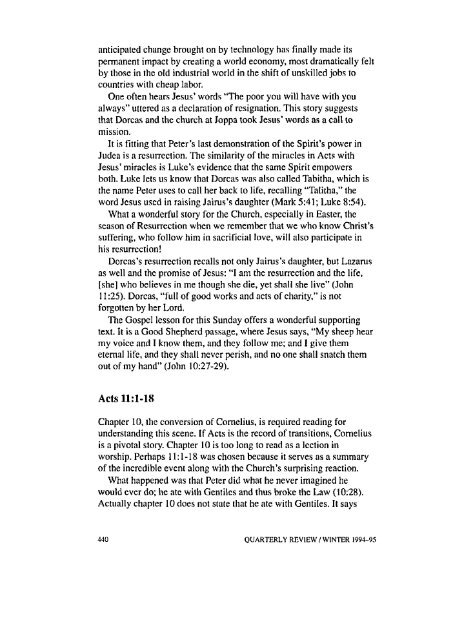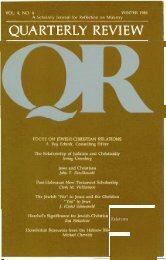Winter 1994 - Quarterly Review
Winter 1994 - Quarterly Review
Winter 1994 - Quarterly Review
Create successful ePaper yourself
Turn your PDF publications into a flip-book with our unique Google optimized e-Paper software.
anticipated change brought on by technology has finally made its<br />
permanent impact by creating a world economy, most dramatically felt<br />
by those in the old industrial world in the shift of unskilled jobs to<br />
countries with cheap labor.<br />
One often hears Jesus' words "The poor you will have with you<br />
always" uttered as a declaration of resignation. This story suggests<br />
that Dorcas and the church at Joppa took Jesus' words as a call to<br />
mission.<br />
It is fitting that Peter's last demonstration of the Spirit's power in<br />
Judea is a resurrection. The similarity of the miracles in Acts with<br />
Jesus' miracles is Luke's evidence that the same Spirit empowers<br />
both. Luke lets us know that Dorcas was also called Tabitha. which is<br />
the name Peter uses to call her back to life, recalling "Talitha," the<br />
word Jesus used in raising Jairus's daughter (Mark 5:41; Luke 8:54).<br />
What a wonderful story for the Church, especially in Easter, the<br />
season of Resurrection when we remember that we who know Christ's<br />
suffering, who follow him in sacrificial love, will also participate in<br />
his resurrection!<br />
Dorcas's resurrection recalls not only Jairus's daughter, but Lazarus<br />
as well and the promise of Jesus: "I am the resurrection and the life,<br />
[she] who believes in me though she die, yet shall she live" (John<br />
11:25). Dorcas, "full of good works and acts of charity," is not<br />
forgotten by her Lord.<br />
The Gospel lesson for this Sunday offers a wonderful supporting<br />
text. It is a Good Shepherd passage, where Jesus says, "My sheep hear<br />
my voice and I know them, and they follow me; and I give them<br />
eternal life, and they shall never perish, and no one shall snatch them<br />
out of my hand" (John 10:27-29).<br />
Acts 11:1-18<br />
Chapter 10, the conversion of Cornelius, is required reading for<br />
understanding this scene. If Acts is the record of transitions, Cornelius<br />
is a pivotal story. Chapter 10 is too long to read as a lection in<br />
worship. Perhaps 11:1-18 was chosen because it serves as a summary<br />
of the incredible event along with the Church's surprising reaction.<br />
What happened was that Peter did what he never imagined he<br />
would ever do; he ate with Gentiles and thus broke the Law (10:28).<br />
Actually chapter 10 does not state that he ate with Gentiles. It says<br />
440 QUARTERLY REVIEW / WINTER <strong>1994</strong>-95












